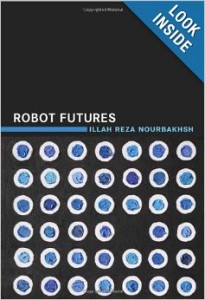I attended a robotics media panel recently and was disheartened when the topics were announced. Three public voices central to communicating the complexities of robotics were about to engage us in an hour-long discussion on the two most contrived topics: drones, and robots taking our jobs. I patiently sat to indulge the predictable concerns, hoping someone might enlighten me with something new.
Just a few days later I read Illah Reza Nourbakhsh book Robot Futures and found what I was looking for. I believe Nourbakhsh would have been similarly unenthused with the topics, though the the contrast of profound contributions would have been refreshing. This situation is symptomatic of the nature of the hazy field, a moment he calls “robot smog.” Perpetually just beyond our reach, the existing technologies don’t offer much else to discuss but the relevant controversies.
His ethical probings consider the challenges and benefits of interacting with robots; the new spaces of augmented reality; and how, someday, our very bodies will be littered with nanobots. He does so from the expert perspective of a Carnegie Melon University engineer, and with great humility.
To inform the world of what is to be expected from robotic innovations over the next few decades, Nourbakhsh sets out to describe the haziness of this “ragged frontier.” The varying innovative paces of the key robot ingredients, from hardware to networks, make predicting what will be deemed a “robot” in the future nearly impossible, though worthwhile. His knowledge of the technologies, juxtaposed with his sci-fi vignettes, offer a glimpse of the future and of the author himself. Nourbakhsh creates a space in which we can begin to grasp our future. He reasons that, though much of the technology now seems superfluous and confined to places humans don’t want to be, we ought to thoughtfully consider their potential.
We have every reason to believe that we will embrace robots and other interactive media the way we have our smartphones. We were born multitaskers, and hang on our friend’s every recommendation for flash card, cloud storage, and babysitter apps. We can’t help but yearn for the kaleidoscope of ways to expedite our daily to-dos. Imagine how the average robot—smarter than the average human—could help and work with you.
Nourbakhsh describes intelligent systems that are already engrained in our society. Adbots—data-mining algorithms for ad-placement—bridge the digital and physical worlds in profound ways. When your regular news source websites start showing you overstock.com products that you were scrolling through the day before do you feel a little twinge? What will these dynamic marketing strategies make of our free will? Aren’t they judging our actions—our search results—to feign knowing us?
This is the unsettling aspect of our future with robots. They will know more than and about us, using their seeming omnipotence to give us superpowers. Our masterful multitasking will only feed the billowing innovation. The human-machine interface will grow exponentially indecipherable, and our roles on the planet will look as foreign as the profession of computer programmer might to a pilgrim. Perhaps every life will become, as Nourbakhsh puts it, the “CEO of Me Incorporated”, in which physical limitations disappear and we are in multiple places at once. Institutions will be similarly enhanced.
The majority of research happening today is government funded, and much of it won’t effect the lives of the American public any day soon. Nourbakhsh himself has devoted his time and talent to developing interactive media to educate the public of technology, thereby effecting their daily lives. He encourages creators to seek altruistic motivations and funding.
What Nourbakhsh manages to emphasize amidst his frank depictions of possible futures, is a vote for humanity’s ability to adapt as we have in the past—an idea often overlooked by popular media and the panel alike. What he sees in this new human-inspired race is an opportunity “to affirm the most non-robotic quality of our world: our humanity.”
Charlotte Shea is a science journalist from the San Francisco Bay Area, and may be reached at aline4shea@gmail.com
Robot Futures may be purchased here: http://www.amazon.com/Robot-Futures-Illah-Reza-Nourbakhsh/dp/0262018624/


Pingback: Synchronized Chaos » Blog Archive » Synchronized Chaos November 2013 – Mapping the Inner and Outer Cosmos